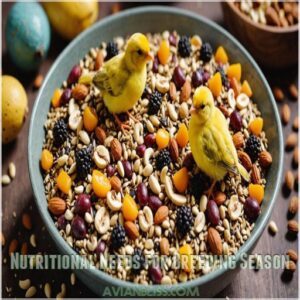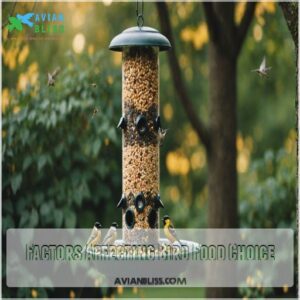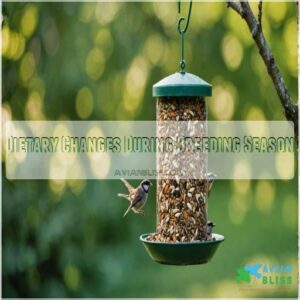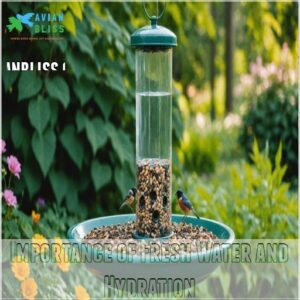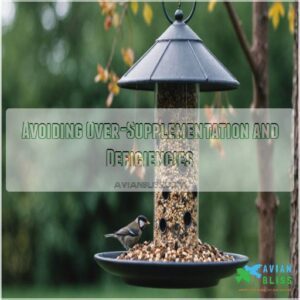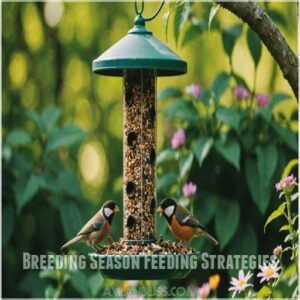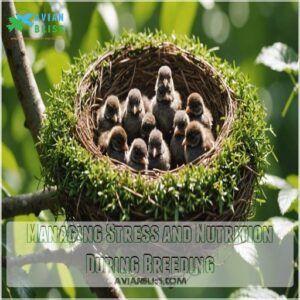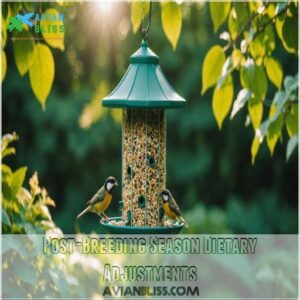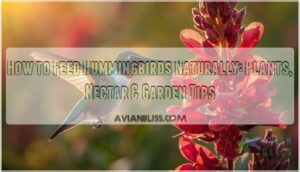This site is supported by our readers. We may earn a commission, at no cost to you, if you purchase through links.
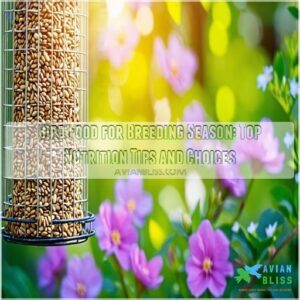 During the breeding season, birds need a diet rich in proteins, calcium, and vitamins to support their energy and egg production.
During the breeding season, birds need a diet rich in proteins, calcium, and vitamins to support their energy and egg production.
Imagine your birds’ appetite as hefty as a teenager’s during growth spurts!
Proteins from mealworms or egg foods supercharge their growth and development.
Calcium is another star player, essential for strong eggshells and nestling bones, which can be found in crushed oyster shells or vitamin supplements.
Don’t forget fresh fruits and veggies for balance!
Choosing the right bird food for breeding season can feel like a culinary balancing act, but with the right mix, your feathered friends will thrive.
Curious about top food picks?
Table Of Contents
- Key Takeaways
- Nutritional Needs for Breeding Season
- Factors Affecting Bird Food Choice
- Top 5 Bird Foods for Breeding Season
- Dietary Changes During Breeding Season
- Importance of Fresh Water and Hydration
- Avoiding Over-Supplementation and Deficiencies
- Breeding Season Feeding Strategies
- Managing Stress and Nutrition During Breeding
- Post-Breeding Season Dietary Adjustments
- Frequently Asked Questions (FAQs)
- What should a bird eat in spring?
- When is the best time to breed a bird?
- How do you prepare a bird for a breeding season?
- Do birds have multiple broods during the breeding season?
- Do birds eat more during breeding season?
- What to feed a nesting bird?
- Is it OK to feed birds in summer?
- What months should you feed birds?
- How do weather conditions affect bird feeding?
- Which foods attract specific bird species?
- What are common feeding mistakes to avoid?
- How can I support birds with limited resources?
- Are homemade bird foods suitable for breeding?
- Conclusion
Key Takeaways
- Boost your birds’ diet with proteins, calcium, and essential vitamins during breeding season for optimal egg production and chick growth.
- Consider species-specific dietary needs, factoring in age, size, and regional climate to tailor the perfect bird food mix.
- Rotate foods to prevent boredom and offer fresh fruits and vegetables to balance their diet and enhance nutritional benefits.
- Provide fresh water consistently, monitor its quality, and include water-rich foods to support hydration throughout the breeding season.
Nutritional Needs for Breeding Season
Breeding season demands a significant nutritional boost for your feathered friends. You’ll need to increase protein, calcium, and essential vitamins to support egg production, chick development, and overall parental health.
Importance of Calcium and Vitamins
Perhaps you’ve wondered why your birds need calcium and vitamins during breeding season.
Calcium is essential for eggshells, ensuring they’re not fragile.
Meanwhile, Vitamin D supports growth, and Vitamin E boosts fertility.
Together, these nutrients prevent nutritional deficiencies, playing a key role in bird breeding.
Keep a watchful eye on their seed intake, especially with nutritious options like flax seeds for birds, and keep their diet balanced, and you’ll see the benefits in bird nutrition and avian ecology.
Role of Proteins and Carbohydrates
While calcium helps build strong eggshells, proteins and carbohydrates play pivotal roles too.
Proteins support egg production and the growth stages of chicks, providing the building blocks they need.
Carbohydrate sources supply the energy balance necessary for active bird breeding and feeding habits.
By focusing on nutrients like high-protein food sources, such as mealworms for bird diets, you’ll support a balanced diet suited to bird species and habitat needs.
Essential Minerals and Supplements
You know, during the breeding season, minerals and supplements play a key role for your feathered friends.
Calcium is essential for egg laying, while Vitamin D ensures proper absorption.
Don’t forget shell grit to aid digestion and prevent mineral deficiencies.
Make sure supplement safety is considered, taking into account your bird species’ needs for successful reproduction, nesting, and parental care—keeping their future bright!
Factors Affecting Bird Food Choice
When choosing bird food for the breeding season, you’ll need to think about factors like species-specific dietary needs, the bird’s age and size, and the climate of your area.
It’s a bit like cooking for a picky toddler, except this one might prefer mealworms over macaroni.
Species-Specific Dietary Requirements
Considering the unique nutritional needs of various bird species during breeding season, you’re balancing a fine mix.
Some birds thrive on specific seed types, while others need more fruit preferences or mineral supplements.
Understanding regional variations in bird habitats and behaviors can guide your choices.
It’s like being a gourmet chef, whipping up the perfect meal customized to your avian diners.
Age and Size of Birds
Feeding birds isn’t a one-size-fits-all process.
Nestling nutrition is essential for chick development, requiring a diet rich in proteins.
Juveniles benefit from a varied diet to guarantee proper growth.
For adults, maintaining their nutritional needs supports both routine health and successful bird mating.
Remember, different bird species and sizes will have unique dietary requirements, so tailor your feeding strategy accordingly.
Climate and Geographic Location
Now that you’ve considered the bird’s age and size, let’s look at where they live.
Climate and geography hugely impact food choices.
Think about it:
- A snowy owl in Alaska needs different food than a hummingbird in the Amazon.
- Seasonal variations mean food availability changes throughout the year.
- Local plant availability dictates what seeds and fruits are accessible.
Understanding these factors helps you provide the best nutrition during the bird mating season and beyond.
Climate change affects this, too, so stay informed!
Top 5 Bird Foods for Breeding Season
When choosing food for the breeding season, it’s important to focus on nutritional balance to support your birds’ health.
We’ll explore the top five bird foods, including options that enhance calcium and protein intake, ensuring your feathered friends thrive during this important time.
1. VitaSmart Bird Calcium Supplement
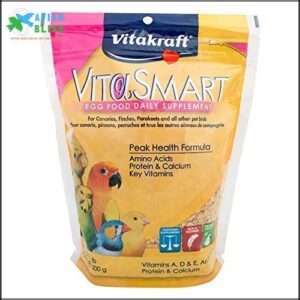
When breeding season arrives, ensuring your feathered friends get enough calcium is essential, and that’s where VitaSmart Bird Calcium Supplement steps in.
It provides essential calcium, but it also offers digestible protein, vitamins, and amino acids.
Birds love the egg flavor, making it a hit during stressful periods like molting, and it’s especially important to prevent low blood calcium levels in birds, which can lead to weak bones and soft-shelled eggs, as seen in avian calcium deficiency issues.
It’s versatile, mixing well with finch or parrot seeds, and even acts as a handy carrier for medications.
With VitaSmart, you’re giving your birds the boost they need to thrive.
Best For: This is a great calcium supplement for birds of all ages, especially during breeding season, molting periods, and times of stress.
- Provides essential calcium and digestible protein.
- Birds love the egg flavor, making it easy to feed.
- Versatile, it can be mixed with various bird foods and used as a medication carrier.
- It’s not a complete diet and should be used as a supplement.
- There may be some birds who are sensitive to egg products.
- It’s important to follow the recommended dosage instructions to avoid overfeeding.
2. Kaytee Conure Lovebird Food
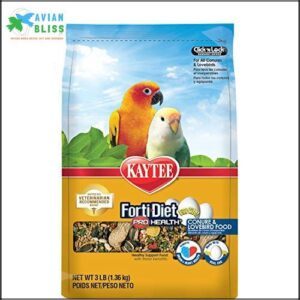
Choosing the right food for your feathered friends during breeding season can feel like a tightrope walk.
Kaytee Conure Lovebird Food offers a well-balanced mix of seeds and grains fortified with real egg, providing essential proteins and fatty acids.
It supports vibrant plumage, thanks to Omega-3s, and promotes digestive health.
Despite its messy hulls, this choice keeps your birds in top shape, especially during breeding and molting.
Just remember, supplementing with fresh veggies will keep your birds chirping with joy.
Best For: This is a good choice for Conures and Lovebirds, especially during breeding and molting seasons.
- Contains real egg for high quality protein, essential nutrients, and fatty acids
- Includes Omega 3’s to support brain and heart health
- Enhances skin and feather health for vibrant, healthy plumage
- Some users noted that the hulls of the seeds can create a mess
- It is recommended to supplement this food with fresh fruits and vegetables as an all-seed diet is unhealthy
- The food is a seed and grain based diet with Omega 3’s, Probiotics, and Prebiotics plus farm fresh egg crumbles
3. Hari Tropican Bird Food
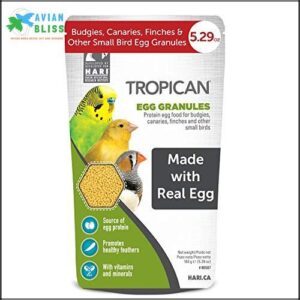
Hari Tropican Bird Food stands out for breeding season with its scientifically formulated blend of grains and whole egg. This provides essential amino acids and high-quality protein.
Additionally, it includes Vitamins A and E for immune health and feathering, plus Vitamin D for strong bones.
Since the granules are hard, you might need to crush them for smaller birds.
Although some may find it pricey, its lack of artificial additives makes it a worthwhile choice for budgies, finches, and more.
Best For: This is a great choice for budgies, finches, and other small birds, especially during breeding season.
- Provides high-quality protein and essential amino acids from whole egg.
- Contains vitamins A, E, and D for immune health, feathering, and bone strength.
- Free of artificial colors, flavors, and preservatives.
- Granules are hard and may need to be crushed for smaller birds.
- Some birds may find the granules unappealing.
- Can be expensive compared to other brands.
4. Wild Bird Food Mealworms For Birds
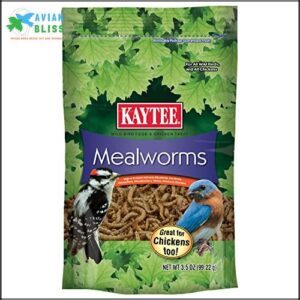
Mealworms are a fantastic source of protein for wild birds during the breeding season, ensuring their nests thrive.
Birds can’t resist this nutritious, high-energy treat, especially nesting ones needing an energy boost.
Kaytee’s dried mealworms are convenient, offering quality and affordability.
They’re easy to store and can be safely fed alone or mixed with seeds.
Plus, birds enjoy them rehydrated in bird baths!
Just remember, variety is key in their diet, so space out these tasty morsels to keep your birds healthy and happy.
Best For: Wild birds, especially those nesting, looking for a high-protein treat.
- High-protein and energy-rich for birds.
- Convenient, affordable, and easy to store.
- Can be fed alone or mixed with other birdseed.
- Should be fed in moderation to maintain a balanced diet.
- Some customers have reported finding beetles in their bags.
- May not be suitable for all bird species.
5. Higgins Protein Egg Bird Food 3 Pack
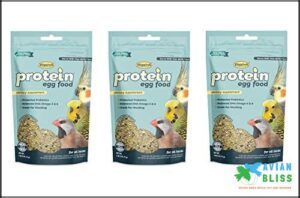
The Higgins Protein Egg Bird Food 3 Pack is like a Swiss Army knife for your feathered friends during breeding season.
It’s packed with protein from baked whole eggs and whole grain bread crumbs, offering essential amino acids like methionine and lysine.
With added DHA Omega-3 and 6 fatty acids, plus vitamins and minerals, it’s a powerhouse for health and energy.
Not all birds will readily accept it, but smaller bags help maintain freshness, minimizing waste.
Share it with your birds and watch them thrive.
Best For: Birds needing extra protein, especially during breeding season.
- Packed with protein from baked whole eggs and whole grain bread crumbs.
- Enriched with DHA Omega-3 and 6 fatty acids, plus vitamins and minerals for overall health.
- Smaller bags help maintain freshness and minimize waste.
- Some birds may benefit from a varied diet with fresh options like ZuPreem FruitBlend Pellets, which can help meet their nutritional needs during breeding season. Some birds may be picky eaters and refuse this food.
- Can be expensive compared to other bird foods.
- Contains sugar, which may not be suitable for all birds.
Dietary Changes During Breeding Season
As breeding season approaches, you’ll need to adjust your birds’ diets to meet their increased energy demands.
This means boosting protein intake and providing more frequent, higher-quality meals.
Including fresh fruits and vegetables to support egg production and chick development.
Increased Energy and Protein Requirements
Switching gears from top bird foods, let’s talk about beefing up energy and protein for breeding. It’s essential for egg production and chick growth.
Here’s a quick hit list:
- Protein-rich seeds enhance avian reproductive biology.
- Insects offer energy replenishment.
- Legumes boost bird physiology.
- Nuts support parental care.
Make these dietary changes to keep your birds thriving!
Adjusting Food Quantity and Frequency
To accommodate your birds’ breeding season needs, consider boosting both the quantity and frequency of their meals.
With larger brood sizes and demanding nestling needs, variety becomes essential.
Keep a keen eye on food portions and mealworm amounts, ensuring they’re aligned with your specific bird species.
It’s a balancing act, not unlike juggling bird chicks during their hectic development!
Providing Fresh Fruits and Vegetables
After adjusting food quantity, explore fresh fruits and vegetables to enhance nutritional benefits during breeding season.
Seasonal options from bird-friendly plants add variety and energy.
Make sure fruit is safe by washing well, and focus on vegetable selection that native birds relish.
Use creative feeding methods like bird feeders or friendly gardening to serve up these natural treats, enriching your bird-friendly landscaping effortlessly.
Importance of Fresh Water and Hydration
You can’t underestimate the importance of fresh water during the bird breeding season, as it plays a critical role in hydration and overall health.
Fresh water is essential for birds during breeding season.
By ensuring birds have access to clean water, monitoring its quality and temperature, and providing water-rich foods, you help support their hydration needs effectively.
Ensuring Access to Clean Water
Quenching your feathered friends’ thirst involves more than a bird bath.
Fresh water is essential for their health and wellness.
Here’s how to make sure they’ve access:
- Offer a bird-friendly yard with multiple water sources.
- Keep water clean to maintain hygiene.
- Make sure it’s easy for birds of all sizes to get to the water.
- Replace water frequently to avoid contamination.
Monitoring Water Quality and Temperature
Once you’ve secured a clean water source, tackle water quality and temperature.
Consider water purity and hygiene as they impact bird health.
Regular water changes guarantee freshness, which is key during the bird breeding season.
With temperature control, maintain ideal conditions to aid in bird mating success.
This helps bird population trends by supporting species survival through proper hydration.
Providing Water-Rich Foods and Treats
Proper hydration is essential during bird breeding.
You can boost your birds’ water intake by offering water-rich fruits like watermelon and berries.
Think of it as a cool summer treat!
A balanced diet with pellets for good nutrition also helps maintain hydration levels.
Juicy vegetables, such as cucumbers and lettuce, also contribute to hydration.
These additions, alongside fresh water, help maintain good health during nesting and fledgling stages.
Remember, during bird mating season, hydration is key for successful breeding.
Experiment with DIY recipes to add variety and appeal.
Avoiding Over-Supplementation and Deficiencies
When feeding birds during the breeding season, ensuring they get just the right amount of nutrients is essential—you wouldn’t want them to feel like they’re at an all-you-can-eat buffet or, worse, a famished banquet.
By understanding the signs of nutritional imbalances and carefully balancing supplements with natural foods, you can support their health without overdoing it.
Risks of Over-Supplementation
While ensuring your birds stay hydrated, don’t overdo it with supplements.
Too much calcium can lead to toxicity, and excessive vitamins cause imbalances.
Birds need independence, not a buffet of nutrients.
Over-supplementation might give your feathered friends digestive grief or even feather problems.
Keep their food balanced during mating season to avoid bird diseases or issues like avian flu.
Identifying Signs of Nutritional Deficiencies
Spotting nutritional deficiencies in birds can feel like cracking a mystery code.
Look for clues: brittle feather condition, unexplained weight loss, or poor egg quality.
Beak deformities and delayed molting issues might also signal trouble.
For best results, consider using a specialized Breeding Bird Food.
Remember, bird mating season is a whirlwind, and their nests need quality bird food for their safety.
Keeping bird biodiversity in mind helps maintain balance.
Balancing Supplements and Natural Foods
After noting nutritional deficiencies, let’s chat about balancing supplements with natural foods.
Supplement risks are real—overdoing it can disrupt a bird’s hormones.
Instead, craft a balanced diet using natural food sources.
Focus on supplement timing during the bird mating season to support egg production without the fuss.
Trust your instincts and mix things up to keep feathered friends thriving!
Breeding Season Feeding Strategies
To help your birds thrive during breeding season, experiment with rotating their diet to keep them entertained and engaged.
Rotating their diet can help keep your birds engaged and entertained.
You can also consider adding oats to their meals, as they’re a good source of slow-release carbohydrates for sustained energy learn more about can birds eat oats. You can also offer treats and rewards, making feeding time both nutritious and stimulating for your feathered friends.
Rotating Foods to Prevent Boredom
Too much of one thing can spoil your bird’s appetite, just like us with frozen pizza every night.
Rotate different bird foods to keep things fresh during mating season.
This keeps their taste buds happy and minds sharp.
Additionally, varying their surroundings by placing bird feeders in locations that balance sun and shade, like optimal bird feeder placement, can also support their mental engagement.
Mix up their diet with variety, foraging activities, and sensory stimulation to prevent boredom, supporting mental engagement and minimizing bird stress.
Offering Treats and Rewards
Because treats enhance bird courtship and pairing, offer small amounts of nutritious goodies during bird mating season.
Think of it as a bonus for good behavior!
These rewards aid training and strengthen the bond between birds.
Remember, moderation is key; too many treats can disrupt their diet.
During breeding season, providing treats that mimic natural foraging experiences can help reduce stress, especially for birds prone to egg laying without a mate. Use treats strategically for enrichment, especially during bird egg laying.
Healthy options include small pieces of fruit or cooked vegetables.
Managing Stress and Nutrition During Breeding
You can keep your birds happier and healthier during breeding by reducing environmental stressors and providing mental stimulation with simple toys.
Mental stimulation can be provided with simple toys.
Adjusting nutrition to include stress-reducing foods rich in essential nutrients will also support their well-being during this demanding time, ensuring they thrive without ruffling too many feathers.
Minimizing Environmental Stressors
Don’t let environmental stressors ruffle your feathers.
Make sure you have a peaceful bird breeding season by choosing nest sites away from noise pollution and keeping predators at bay.
Climate change can alter environmental cues, so adapt your strategy to protect your habitat.
With careful nest site selection and predator control, you’re setting the stage for successful incubation, nestling, and fledgling growth.
Providing Mental Stimulation and Exercise
After lessening environmental stressors, you’ll want to keep your birds’ minds sharp and bodies active.
Use bird toys and puzzle feeders for enrichment.
Make sure cage size allows for adequate flight time, and consider creating a backyard bird habitat.
These steps, paired with bird relaxation techniques and a balanced diet that includes nutrient-rich foods like millet for bird nutrition, will make the bird mating season more enjoyable for your feathered friends.
Adjusting Nutrition to Reduce Stress
Eating stress-reducing treats some birds can’t get enough of is key during the mating season, as birds are sensitive to environmental factors, such as lighting conditions affecting sleep patterns.
Help your feathered friends stay calm with dietary enrichment, like a variety of foods and calming supplements.
Think of environmental factors—bird climate and temperature play essential roles.
Adjust nutrition to support hormonal control and gonadal development, ensuring everyone is as harmonious as a choir of sparrows.
Post-Breeding Season Dietary Adjustments
As breeding season wraps up, you’ll need to smoothly shift your birds to maintenance foods to support their ongoing health.
Keep an eye on their condition and adjust nutrition accordingly, preparing them for the next breeding cycle with the best possible care.
Gradually Transitioning to Maintenance Foods
So, you’ve managed stress like a pro.
Now, ease your feathered friends back into their regular diet.
Gradual food changes help maintain post-breeding health.
Swap high-energy goodies for maintenance staples while noting your bird’s nutritional needs.
Keep that feeding schedule steady; it’s essential after the bird mating season.
Such adjustments align with bird migration patterns and promote a bird-friendly home.
Monitoring Bird Health and Adjusting Nutrition
You’ll want to keep a close eye on your feathered friends‘ health after the breeding season.
Regularly check for: 1. Weight changes; 2. Feather condition (molting season can be tricky!); and 3. Signs of parasites.
Consider supplementing their diet with a nutrient-rich Chick Feed Mix formula. Maintain consistent water consumption and adjust their diet gradually.
Weight monitoring is key to spotting problems early, ensuring good bird health and nutrition. Remember, a healthy bird is a happy bird!
Preparing for The Next Breeding Season
As you’re keeping an eye on bird health, it’s wise to start preparing for the next breeding season.
Focus on stable nutrition that supports pre-breeding health, including nest site selection and mating rituals.
Here’s a helpful guide:
| Focus Area | Tips for Preparation | Benefits |
|---|---|---|
| Nutrition | Balanced diet for breeding | Strong mating system |
| Environment | Secure nest sites | Territorial behavior |
| Behavior | Understand courtship displays | Brood size management |
Frequently Asked Questions (FAQs)
What should a bird eat in spring?
What fuels a bird’s spring includes seeds, insects, and fruits.
Seeds provide energy, insects offer protein, and fruits add vitamins.
A variety in their diet is important for a successful breeding season as they prepare nests and care for chicks.
When is the best time to breed a bird?
Spring and summer are prime times to breed birds, as warmer temperatures and abundant food create favorable conditions.
Timing can vary with specific bird species, so consider their natural breeding habits and environmental cues for best results.
How do you prepare a bird for a breeding season?
Preparing your bird for breeding season involves ensuring an ideal environment, providing nutrient-rich foods, and monitoring health.
Adjust photoperiod and temperature to mimic natural conditions.
Observe behavioral cues like nesting or courtship to gauge readiness.
Do birds have multiple broods during the breeding season?
It depends on the species!
Some birds raise just one brood, others have multiple.
Factors like food availability and predation pressure influence how many times they breed.
Think of it like their own personal family planning!
Do birds eat more during breeding season?
Birds typically eat more during the breeding season to meet their energy demands for courtship, nest-building, and feeding chicks.
They adapt by selecting food rich in protein and fats, ensuring enough energy to raise healthy offspring.
What to feed a nesting bird?
Feed nesting birds a diet rich in protein and calcium to support egg production and chick development.
Offer high-quality bird seed, mealworms, suet, and fresh fruit.
Make sure water is readily available to keep them hydrated.
Is it OK to feed birds in summer?
While summer offers birds a buffet of natural treats, your backyard can become their favorite cafe.
Providing seeds and fresh water supports their diet when natural sources dwindle, ensuring they stay energized and healthy.
What months should you feed birds?
You should feed birds year-round, but it’s especially helpful in winter and early spring when natural food is scarce.
Summer feeding is fine too, but remember to offer fresh water and adjust feeding quantities.
How do weather conditions affect bird feeding?
Around 40% of birds rely on weather cues for feeding routines.
Rain increases food accessibility, but extreme cold or heat reduces it.
Birds adapt feeding by shifting foraging times and behaviors to maximize survival and energy intake.
Which foods attract specific bird species?
Ever watched a bird dance for seeds?
Blue jays love peanuts, hummingbirds sip nectar, and goldfinches feast on nyjer seeds.
Each food type attracts specific species, turning your backyard into a vibrant avian haven.
What are common feeding mistakes to avoid?
Like a ship needing proper ballast, avoid overfeeding; it’s unhealthy.
Don’t offer spoiled food; it’s dangerous.
Make sure they’ve a varied diet; they need diverse nutrients.
Observe their eating habits; adjust accordingly.
How can I support birds with limited resources?
Create a bird-friendly space with water sources, native plants, and habitats using recycled materials.
Simple feeders offer food, while leaving leaf litter provides insects.
Support conservation groups that advocate for birds, ensuring a thriving feathered community.
Are homemade bird foods suitable for breeding?
When you put all your eggs in one basket, homemade bird foods can work for breeding, but they’re like a wild card.
Birds need specific nutrients during this time, so consult expert recipes and supplements to make sure their diets are balanced.
Conclusion
Choosing the right bird food for breeding season can feel like a delicate dance balancing nutrients against nature’s demands.
Just like a chef perfects a recipe, you’ll fine-tune your bird’s diet with proteins for growth, calcium for strong eggshells, and a mix of fruits and veggies for energy.
Remember, the right mix isn’t just about food—hydration and stress management play key roles too.
Keep these tips in mind, and your feathered friends will thrive through their breeding journey.

